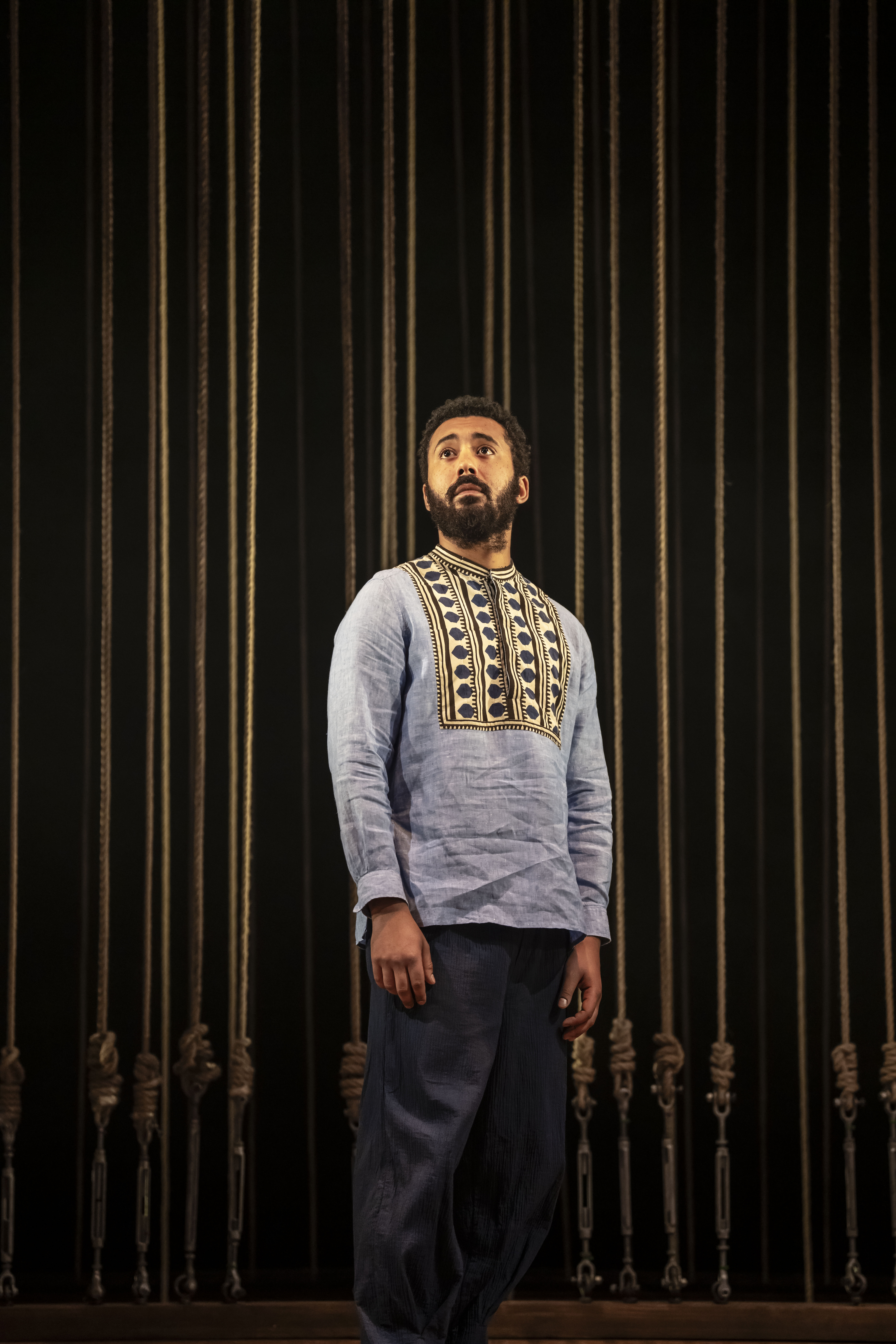We want to hear from you! Take our brief reader survey now and share your feedback on what you love at Third Coast Review—and what we could be doing better! Plus, everyone who completes the survey will receive a Third Coast Review sticker decal as our thanks for your support.
Pericles, Prince of Tyre, has landed in Tarsus. He has the benefit of complete anonymity as he enters King Simonides’ jousting contest. What does the winner receive? The hand of Princess Thaisa in marriage—and Pericles, like so many others, can’t help but throw his hat in the ring.

Fans of Shakespeare’s work are no stranger to impressive feats of stage combat. I have often seen productions full of swordplay, quarterstaffs, and so much more. Shakespeare’s work rarely hides from war and battle, and these are often moments that leave the audience in awe. Director Tamara Harvey’s production of Pericles by the Royal Shakespeare Company is no exception; however, the team takes a slightly different approach. The Royal Shakespeare Company of Stratford-Upon-Avon, England, last performed at Chicago Shakespeare Theater 30 years ago.
When the actors get into place with their weapons and the sound fires, the audience is immediately hit with a dramatic shift. The actors heavily slow down, and we see them weave in and out of ensemble formations. In place of traditional stage combat, movement director Annie-Lunnette Deakin-Foster creates a choreography sequence—one that feels almost like a ballet. Live music fills the space (by composer Claire Van Kampen and the powerful live orchestra), and lighting designer Ryan Day hits the actors with a mix of greens and blues. Every character whom Pericles defeated finds their way to weave out of the choreography as a new actor takes his place to pick up the fight. The result is a stunning piece of movement, one that certainly left me sitting on the edge of my seat—attempting to absorb every detail. As Pericles lowers himself to one knee to accept his prize, the audience roared with applause.

William Shakespeare’s comedy follows Prince of Tyre Pericles (Zach Wyatt), and the dramatic journey on which he embarks after learning of some dangerous secrets in Antioch. The play takes place in two main segments. Act One portrays the leadup to Pericles’ marriage to Princess Thaisa (Leah Haile), and Act Two offers the fallout 14 years later, when Pericles’ daughter, Marina (Rachelle Diedericks) is abducted and must find her way back to her long-lost family. As with any of Shakespeare’s comedies, the play is full of twists and turns. Never do the dark moments last too long, and as always, there is an ending full of love and joy.
Harvey’s artistic team transforms Chicago Shakespeare Theater’s Yard Theater. Most of scenic designer Jonathan Fensom’s stage is left quite open—leaving space for Deakin-Foster’s jaw-dropping movement choreography. Fensom’s design draws the audience into the ship on which Pericles finds himself throughout most of the play. Rarely is furniture brought on and off, but the ropes high above remind us that the sea is never far away. Ryan Day's lighting fills the space with bursts of color—a design that especially shines through when Pericles is at sea. Especially when combined with Van Kampen’s musical compositions, Harvey’s collaboration culminates in a production that feels almost magical—full of imagination and leaving the audience wondering what impressive feat will take place next.

Pericles comprises many shipwrecks as the prince makes his journey, and these scenes in particular demonstrate the strength and creativity of Harvey’s team. At the first one, we see another dramatic shift in the performers as they slow down and showcase highly detailed precision. Deakin-Foster utilizes rope, and the ensemble takes turns tossing Pericles to various corners of the stage, using the rope to trap him at every turn. Day’s lights engulf the audience in deep blues, drawing us into the shipwreck alongside Pericles. Personally, I found it hard to know where to focus on stage—which only added to the dramatic, chaotic feel of the scene, as well as the terror that Pericles was clearly feeling in the moment.
To put it simply, Royal Shakespeare Company's Pericles is a production of imagination and wonder. A deeply talented cast and production team make this a production not to miss.
Royal Shakespeare Company’s production of Pericles continues through December 7 at Chicago Shakespeare Theater at 800 E Grand Ave. Tickets are $88-$96 for performances running Tuesday-Sunday. Running time is 2 hours and 35 minutes with one intermission.
For more information on this and other productions, see theatreinchicago.com.
Support arts and culture journalism today. This work doesn't happen without your support. Contribute today and ensure we can continue to share the latest reviews, essays, and previews of the most anticipated arts and culture events across the city.
